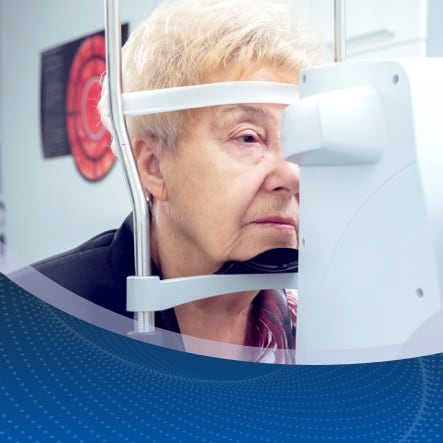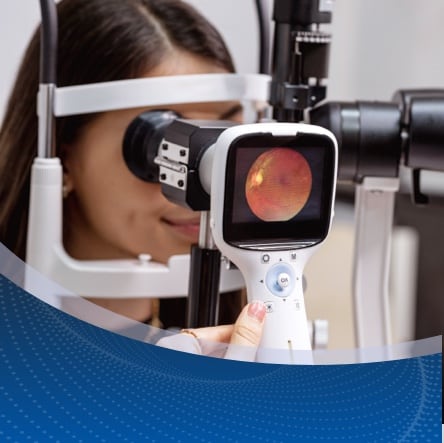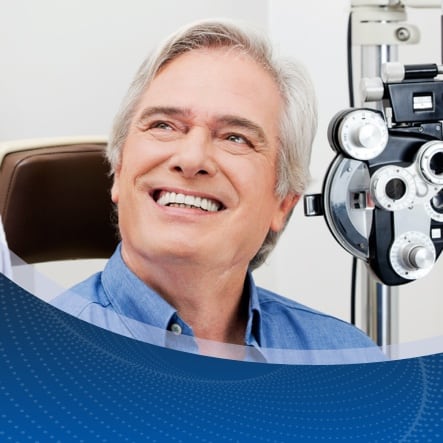Reviewed By: Paul M. Griffey M.D.
Cataract surgery often brings instant clarity to the treated eye, yet it also leaves many patients wondering whether, and when, they’ll need new eyewear. The answer hinges on how the two eyes now work together (or don’t), the intraocular lens (IOL) you received, and how quickly your vision stabilizes. Understanding the short-term imbalance and long-term options for glasses after cataract surgery can help you plan the smoothest possible recovery.
Vision Changes After Single-Eye Surgery
Because only one eye has been corrected, you may experience anisometropia, a temporary mismatch in each eye’s focusing power. Until the second eye is treated or your brain fully adapts, everyday tasks can feel off-kilter—depth perception may falter, distances seem inconsistent, and fine print can jump in and out of focus.
Common Hurdles While You Heal
During this in-between stage, you might notice:
- Depth-perception slips when pouring drinks or stepping off curbs
- Eye strain or headaches as the brain blends two different images
- Double vision in certain lighting or viewing angles
Recognizing these temporary vision quirks lets you take sensible precautions until your eyes are working together again.
How IOL Choice Shapes Your Eyewear Needs
Monofocal IOLs sharpen vision at one set distance, so patients who pick distance clarity usually reach for reading glasses after cataract surgery to handle close-up work. Multifocal or extended-depth-of-focus (EDOF) lenses split light for near, middle, and far tasks, trimming but not always eliminating glasses. Toric IOLs fold astigmatism correction into the implant, reducing (though not always erasing) the need for distance specs if you had significant astigmatism before surgery.
Timing Your New Prescription
Hold off on ordering custom lenses until your vision plateaus. Most surgeons schedule a refraction check about two to three weeks post-op and may advise waiting up to six weeks if healing is slow. Jumping the gun risks paying for glasses that no longer match once swelling subsides and the eye settles.
Should You Keep Wearing Old Glasses?
Running errands in last year’s prescription might seem harmless, but mismatched lenses can amplify headaches, blur, and fatigue. Many patients simply pop out the lens on the surgery side or rely on mild, over-the-counter readers until a proper refraction is safe.
Coping Strategies During Recovery
Until vision evens out, minor adjustments keep you comfortable and safe:
- Use task lighting to make print pop without straining.
- Rely on handrails and avoid night driving until your depth perception feels solid.
- Wear sunglasses outdoors; the healing eye is sensitive to glare.
- Take breaks from screens to ease eye fatigue.
Reading Glasses: Will You Still Need Them?
If your IOL was set for distance and you didn’t choose a multifocal or EDOF design, near tasks, such as reading menus or crafting needlework, will still call for low-power readers. Many people keep several inexpensive pairs around the house; others opt for a single prescription pair once both eyes are stable.
Commonly Asked Questions
Does Medicare pay for glasses after cataract surgery?
Original Medicare Part B covers one standard pair of prescription eyewear (basic frames or a set of contact lenses) following each cataract surgery that includes an IOL. You pay the Part B deductible plus 20 percent of the Medicare-approved amount and any upgrade costs. Visit our Medicare cataract surgery guide for a complete breakdown.
How soon after cataract surgery can I get new glasses?
Most surgeons recommend waiting at least two to three weeks, sometimes up to six, so refraction is reliable and you avoid buying two sets of lenses.
Should I wear my old glasses after cataract surgery?
It is better to go without or remove the lens on the surgery side, as mismatched powers can cause discomfort and blur during adaptation.
Will I need glasses after cataract surgery if I have astigmatism?
If you received a toric IOL, many or all distance-vision needs may be covered. Without a toric implant, you’ll likely need glasses for both distance and near tasks.
What follow-up care does Griffey Eye Care provide after cataract surgery?
Griffey Eye Care schedules multiple postoperative checks to track healing, fine-tune refractions, and discuss eyewear options—from budget readers to premium lenses—so your vision plan is tailored to your lifestyle. Wondering why follow-up care matters? Learn more in our post on follow-up importance.
Plan Your Visual Best-Case Scenario
Your surgeon’s guidance, IOL type, and personal vision goals together determine when to replace eyewear, schedule second-eye surgery, or simply wait for adaptation. Keep follow-up appointments, report any lingering imbalance, and remember that most anisometropia issues fade once both eyes share similar optics or your brain finishes recalibrating.
Ready for Clear, Balanced Vision?
If you’re unsure whether it’s time for new glasses after cataract surgery on one eye or want to discuss IOL options for your upcoming second eye, book a quick postoperative exam with Griffey Eye Care & Laser Center. Our team will test stability, fine-tune prescriptions, and map out the next steps so you can enjoy sharp, comfortable sight—no guesswork required.
Call 1-888-873-9348 or schedule an eye exam online.
**Please note that the suggestions provided in this blog are for general informational purposes only and may not be suitable for your specific insurance plan and needs. It is important to consult a qualified healthcare professional for personalized advice and treatment.**












